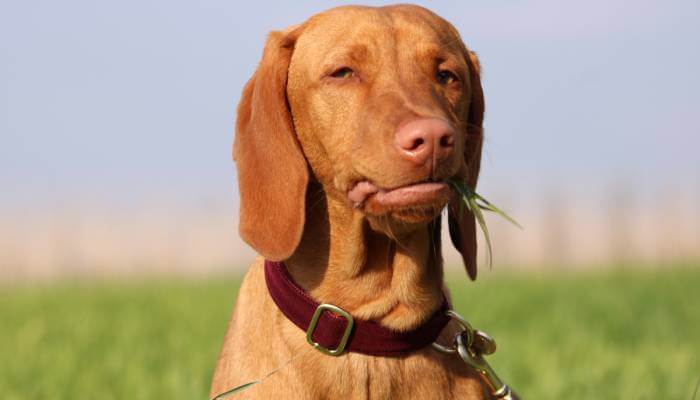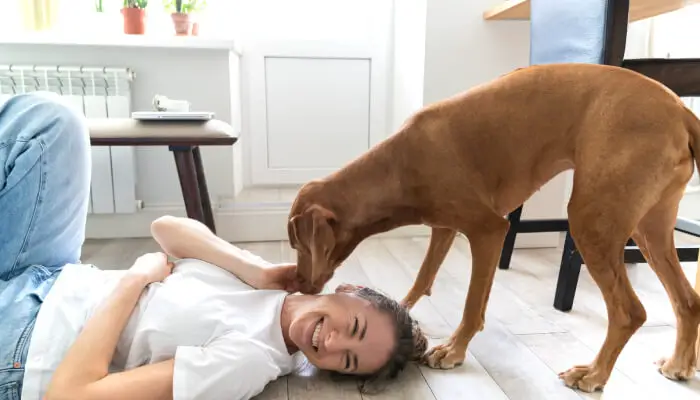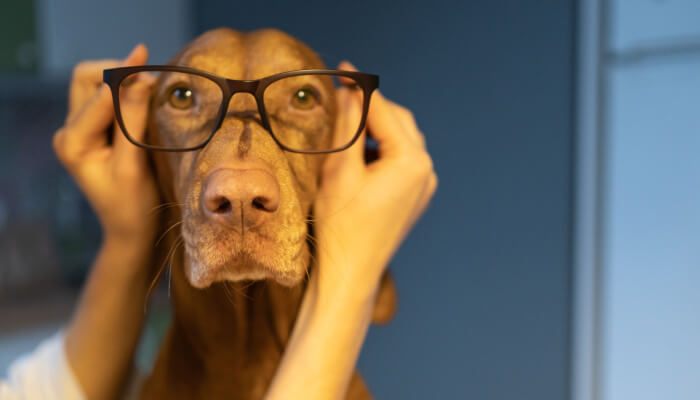Although Vizslas seems like an easy breed to care for, a few health problems are prevalent in this breed. Breathing problems are one of them, and it’s not easy to notice when the breathing problem starts. So, in this article, we are digging deeper into the breathing problems of Vizsla and how you can help your dog with this problem.
Breathing problems in Vizsla are a prevalent condition in dogs. A dog with breathing problems can have many different symptoms and signs of distress, such as coughing, heavy panting, or struggling to take a breath. Any pet owner needs to know the possible causes of these issues to address them and help their animal feel better quickly.
Can Vizsla Have Breathing Problems?
Yes, Vizslas can have breathing problems. The most common type is asthma, a chronic inflammation of the airways that narrows and blocks airflow to the lungs. In addition, allergens, such as pollen or dust can trigger canine asthma. Vizslas usually inhale these substances while breathing.
Vizsla Breathing Problems
Vizslas can have breathing problems because they stay energetic and playful, even when they get old. In addition, the breed has many expressions in its behavior, such as barking, whining, or coughing, but not many people know that those may be signs of respiratory trouble.
Symptoms:
The symptoms of Vizsla’s breathing problems depend on the cause of the problem. So, please note that animals suffering from severe lung infection may show signs like Fever, Chills, Coughing, Difficulty breathing, or fast heart rate.
What Does It Look Like When A Vizsla Is Struggling To Breathe?
When a Vizsla struggles to breathe, it may show this behavior: Panting, Drooling, and even Whimpering, which is often a sign that the animal needs help.
Panting
Panting is the first sign that a Vizsla has trouble breathing. It’s most likely to happen when the dog exercises or when it’s hot outside. The animal breaths with its mouth open wide, and there may be some wheezing heard as well.
Generally, if you see this behavior, don’t wait for anything else to happen. Instead, it would help if you took the dog inside immediately for water. If Vizsla continues panting after drinking plenty of fluids, it means his respiratory system does have an issue that needs veterinary attention fast.
Drooling
Drooling is another symptom of Vizsla having trouble breathing. It is because drool production intensifies while respiratory defenses are down to protect the lining of the mouth.
Whimpering
If your Vizsla is struggling to breathe, not only will he pant but also whimper and cry as if it’s in pain. However, this isn’t always the case though. A healthy dog may whine from time to time too. So you have to be attentive enough when noticing this symptom of breathing problems for Vizslas.
Fast Heart Rate
If a Vizsla is struggling to breathe, you might notice that his heart rate will rise. A healthy dog may also show this symptom now and then but not as often as in the case of respiratory issues.
Coughing
A Vizsla with respiratory issues may also cough. Usually, this is a sign that there is irritation in your dog’s throat and lungs. Coughing indicates that your dog needs immediate treatment. So, it would be best if you visited the vet as soon as possible.
What Can I Do To Help Vizsla With His Breathing Problems?
When your Vizsla is struggling to breathe, you must take him immediately straight to the vet for an examination and possible treatment if necessary. If he’s wheezing or having trouble breathing out of his nose at first, it’s a good idea to pinch his nostrils together and breathe in through the nose, holding your breath for about ten seconds before breathing out.
If that doesn’t work, try blowing into his nose instead. You’ll need to be careful not to blow too hard, though, or you might burst a blood vessel inside of Vizsla’s lungs. If he’s still not breathing after you’ve done both of these things, it means that he might need CPR.
Causes Of Breathing Problems In Vizsla
Vizslas can have different types of problems with their respiratory system, and some are more common than others. The most frequent is asthma which develops because the dog has hypersensitive airways. So when he breathes in allergens or other substances that irritate his system, the airway reacts by becoming swollen and inflamed.
Allergies In Dogs
Allergies are the most common cause of breathing problems in Vizslas. Allergy attacks happen when a dog’s immune system overreacts to an allergen, like pollen, dust, or pet dander and releases histamine. Moreover, this causes inflammation in tissues lining the lungs.
Asthma In Dogs
In some cases, asthma may result due to Vizsla’s immune system. When their immune system reacts to an allergen causes chronic inflammation of the dog’s airways. As a result, your Vizsla will find it difficult to breathe.
Reverse Sneezing
Vizslas can also have reverse sneezing, which is a gasping sound. This sound generates when air forces in from the dog’s throat. It usually happens as a result of an infection in his nasal passages or stomach. If you suspect your Vizsla has reverse sneezing, you should take him to a vet for diagnosis.
Collapsed Trachea Of Vizsla
Collapsed trachea is the most severe respiratory issue that can affect Vizsla. Usually, collapsed trachea means there’s some trauma happening in its throat, making it difficult or even impossible for air to flow through. When this happens, your dog may have trouble breathing and will have a hard time swallowing.
Pneumonia
Another problem Vizsla is susceptible to is pneumonia. It usually occurs due to viruses, bacteria, or even allergies in some cases. Signs include coughing (dry hacking), weakness, fever, loss of appetite, and labored breath sounds while wheezing.
Heart Failure
The worst-case scenario for Vizslas is heart failure which turns out to be fatal in a lot of cases. The symptoms are fatigue, rapid breathing or panting, and even coughing from time to time. If you notice these signs, take your dog to the vet immediately.
Side Effects Of Medication
It’s essential to be aware of the side effects that can happen because your Vizsla takes medication for his breathing problems. In some cases, these may include lethargy and an increased appetite. Thus, it’s a good idea to consult with a vet about what you should do if this happens.
How To Prevent Breathing Problems In Vizslas?
There are a few things you can do to prevent your Vizsla from getting breathing problems.
Keep Allergens And Irritants Far From Vizsla
To make Vizsla’s environment inhospitable for allergens and irritants, it might be a good idea to get rid of carpets at home or install hardwood floors. If you have pets in the house that share their dander with your Vizsla regularly, an air purifier could come in handy as well.
Don’t Force Vizsla To Exercise Too Much.
Exercising is suitable for your Vizsla’s health and can improve his respiratory system. But don’t push him too hard because this may have the opposite effect by irritating his airways. If you want to exercise with your dog, make sure it’s fun and rewarding. It will make it easier for Vizsla to keep doing more of the exercise that he needs.
Keep His Diet Balanced
It’s essential to feed your Vizsla a diet that includes proteins, fats, and carbs to maintain his health. For example, if you want him to have strong muscles and bones, include some excellent protein sources like meat, eggs, and fish.
Give Him A Healthy Treat
Giving Vizsla a treat now and then is good for his mental health. But don’t give him anything that’s unhealthy or too big. It is because this can cause choking, which may lead to breathing problems.
Avoid Stress In Vizsla’s Life
Stress is one of the most common causes for Vizslas to get breathing problems. Try living a more stress-free life by keeping your dog at home. Please do not take him anywhere with higher exposure to things like tobacco smoke, allergens, or other irritants.
How To Cure Breathing Problems In Vizslas?
There are many ways to cure your Vizsla’s respiratory issues, as long as there is no more serious underlying issue like heart or lung failure.
Steroids Or Bronchodilators
One of the most common treatments for a dog with asthma is steroids which will reduce inflammation and allow the dog to breathe more easily.
Many treatment options depend on the underlying cause of your Vizsla’s problems. If the prognosis is poor, you will want to try other treatments like steroids or bronchodilators to improve his breathing and get him on the path to recovery.
If your dog has an allergy with asthma symptoms, you must give medications that help with inflammation and histamine production.
The vet might prescribe steroids or bronchodilators to help with their breathing problems of some Vizsla. You can administer these medicines orally, by injection, or as inhalant medications (sprayed into the nose). If your Vizsla is experiencing asthma, his vet may give him some prednisone. The prednisone will help to keep his airways open and allow him to breathe more easily.
Prognosis For Breathing Problems In Vizslas
If the underlying cause for your dog’s breathing problems is not severe, then the prognosis will be good. But it would help if you took care of your Vizsla by assisting him in eating well, exercising, and getting plenty of rest in between.
Take Them To The Vet As Soon As Possible
If you notice symptoms like coughing, wheezing or rapid breathing in your Vizsla, then take him to the vet as soon as possible. These could be signs of a more severe condition that needs prompt attention.
In some cases, veterinarians also recommend performing surgery to open up airways. The vet generally does it by cutting a hole in the animal’s throat and inserting some tubes to keep him breathing.
In all cases of respiratory distress, you need to take your Vizsla to their vet as soon as possible so that they can get treatment.
It could also be helpful if your dog has any other health concerns like arthritis or kidney disease, as these could be contributing to the breathing issues.
Medications
Many different medications can help your Vizsla with his respiratory issues, depending on the underlying condition.
If your Vizsla has a collapsed trachea or pneumonia, then antibiotics might be best to fight off any infection that’s contributing to his breathing problems.
Conclusion
In conclusion, Vizsla’s often have breathing problems because the breed has a long, narrow muzzle, making it hard to breathe. Thus, it’s essential to take them to the vet as soon as you notice any signs of breathing problems.
Many different underlying causes can contribute to your dog’s breathing problems. And it includes allergies, asthma, and heart failure, among others.
Depending on the severity of their condition, there are several treatment options that you can try for Vizslas with respiratory issues, so don’t give up hope. You can also take your dog to the vet as soon as you notice that he struggles with breathing.



